Home | Category: The Crusades
SEVENTH AND EIGHTH CRUSADES: THE CRUSADES OF ST. LOUIS
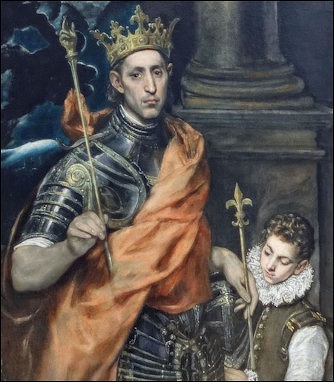
Saint Louis painted by El Greco
The Seventh Crusade was led by St. Louis (Louis IX of France). Louis IX was a great crusader. During the Seventh Crusade to the Holy Land he left France in 1248 and captured Egypt in 1250. He lead another crusade, the Eighth Crusade, in 1270 and died the same year in Tunis of the plague. He was canonized in 1270 as St. Louis.
Louis IX (1214-1270) was the greatest of the Capet kings after Hugh Capet. He ruled France for 44 years (1226 to 1270), arbitrated disputes with his brother-in-law Henry III of England and established a regular court of justice that allowed the right of appeal and sought to end abuses of legal officials.
Carl A. Volz wrote: “In 1249 the first crusading army of Louis arrived near Damietta in Egypt. The city soon capitulated to the Christians, but their efforts to acquire the hinterland were unsuccessful. St. Louis was captured far from his base at Damietta, but was freed on condition that he would abandon Damietta and ransom himself and his fellow prisoners. Again in 1267 the crusade was preached in France, and Louis and his brothers, Charles of Anjou and Alphonse, took the cross. Louis and his expedition sailed to Tunis because the sultan there gave indication of favoring the Crusaders cause. But about a month after his arrival Louis died, and the crusade disbanded. Louis IX was the last of the Crusaders. [Source: Carl A. Volz, late professor of church history at Luther Seminary, The Apostolic Fathers. web.archive.org, martin.luthersem.edu /~]
Islamic History: Islamic History Resources uga.edu/islam/history ; Internet Islamic History Sourcebook fordham.edu/halsall/islam/islamsbook ; Islamic History friesian.com/islam ; Islamic Civilization cyberistan.org ; Muslim Heritage muslimheritage.com ; Brief history of Islam barkati.net ; Chronological history of Islam barkati.net
Fighting and Intrigues Involving the Franks Before St. Louis’s Arrival
The Arab-Muslim chronicler Makrisi wrote in “The Road to Knowledge of the Return of Kings”: “In the year 638 (1240), Salih-Imad-Eddin, who had surprised Damascus, under the reign of Melikul-Adil, fearful that the new sultan would deprive him of this unjust conquest, made an offensive and defensive alliance with the Franks of Syria. He gave them, the better to secure their support, the towns of Safet and Chakif, with their territories, half of the town of Sidon, and a part of the country of the Tiberiad.# He added also the mountain of Aamileh,++ and several other places on the seashore, permitting them to come to Damascus to purchase arms. This alliance displeased good Muslims, who were indignant to see Franks purchase arms in a Muslim town, which these infidels might one day turn against the sellers. [Source: Makrisi, “Essulouk li Mariset il Muluk” (“The Road to Knowledge of the Return of Kings”), in “Chronicles of the Crusades,” ed. H.G.B. (London: Henry G. Bohn, 1848: reissued New York: AMS Press, 1969), pp. 535-556. Makrisi was born 120 years after the expedition of St. Louis.]
“Salih-Imad-Eddin resolved to make war on Egypt, and, assembling his troops, joined the army of the Franks. The sultan of Egypt was informed of this movement, and sent, in consequence, a body of men as far as Acre. The two armies met; but the Egyptians corrupted the Muslim soldiers of Damascus, who, according to their secret conventions, fled on the first attack, and left the Franks singly to bear the shock. They, however, made but a feeble resistance; great numbers were slain, and the rest, loaded with chains, were led to Cairo.
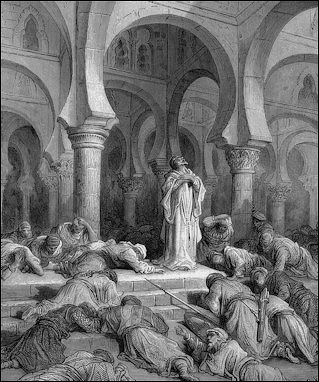
Invocation to Muhammad
“In the 640th year of the Hegira, the Franks surprised the town of Napoulous* on a Friday, the 4th day of the moon Djemazilewel, and made slaves of the inhabitants, after they had plundered them of all they had, and committed all sorts of cruelties. The whole year of 641 (AD 1243) was employed in negotiations between Salih-Inzad-Eddin and Nedjm-Eddin. The latter consented to allow the former to be master of Damascus, but on condition that the town should be a fief to Egypt, and that the coin should be struck in his name. However, as they could not agree, Imad-Eddin made another treaty with the Franks, by which he gave up to them Jerusalem, the whole country of the Tiberiad, and .Ascalon [Ascalon, a town in Palestine, on the Mediterranean shore, six leagues from Gaza. it is built on a rock, but wants a harbour and fresh water]
“The Franks took possession of these towns, and instantly fortified all the castles in the neighbourhood of Tiberias and Ascalon. They expelled Muslims from the mosque Aksa, made a church of it, and hung bells in the minaret. Nedjm-Eddin, on his side, connected himself with the Kharesmiens, a people whose lives were passed in war and plunder. They hastened from the farthest part of the East, crossed the Euphrates, to the amount of ten thousand combatants, under the command of three generals. One division fell back upon Balbeck, and another marched to the very gates of Damascus, pillaging and destroying all that came in their way. Salih-Imad-Eddin shut himself up in Damascus, without attempting to stop the torrent that inundated his dominions. When they had despoiled all the country near to Damascus, they advanced to Jerusalem, took it by storm, and put all the Christians to the sword. The women and girls, having suffered every insult from a brutal disorderly soldiery, were loaded with chains. They destroyed the church of the holy Sepulchre; and when they found nothing among the living, to glut their rage, they opened the tombs of the Christians, took out the bodies, and burnt them.
Franks and Syrians Battle at Gaza
The Arab-Muslim chronicler Makrisi wrote in “The Road to Knowledge of the Return of Kings”: “After this expedition, they marched to Gaza, and deputed some of their principal officers to Nedjm-Eddin. This prince caressed them much, had them clothed in superb dresses, and presented them with rich stuffs and horses of great value. He desired that they would halt their troops at Gaza, where he proposed making a junction of the two armies, promising to march them to Damascus. The troops of the sultan were soon really to take the field, under the command of the emir Rukneddin-Bibars, one of his favourite slaves, and in whose bravery he wholly confided. Bibars joined the Kharesmiens at Gaza. [Source: Makrisi, “Essulouk li Mariset il Muluk” (“The Road to Knowledge of the Return of Kings”), in “Chronicles of the Crusades,” ed. H.G.B. (London: Henry G. Bohn, 1848: reissued New York: AMS Press, 1969), pp. 535-556. Makrisi was born 120 years after the expedition of St. Louis.]
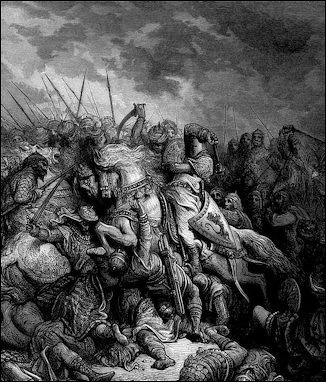
“Imad-Eddin, on his part, raised troops in Damascus: they marched under the orders of Melik-Mansour, prince of Hemesse. The Franks were likewise ready to take the field; and the two bodies met at Acre, when they formed but one army. Nasir-Daoud, prince of Karak,+ and Zahir, son of Songour, also brought some soldiers to the prince of Damascus. This was the first time the standards of the Christians, on which was a cross, were seen intermixed with those of Muslims. The Christians formed the right wing, the troops of Nasir-Daoud the left, and the emir Mansour formed the centre with the Syrians.
“The two armies met near to Gaza. The Kharesmiens made the first onset, which was but faintly opposed by the Syrians, who instantly fled. Zahir, who commanded the left wing, being made prisoner, there only remained the Franks, who for some time defended themselves, but were soon surrounded by the Kharesmiens: the greater part perished on this occasion, except a few that had the good fortune to escape. Eight hundred prisoners were made; and there lay on the field of battle upwards of thirty thousand dead, as well Christians as Syrian Muslims. Mansour returned to Damascus with a few soldiers. The Kharesmiens made an immense booty.
“The news of this complete victory arrived at Cairo on the 15th of the moon Gemazilewel, in the year of the Hegira 642 (Oct. 9, AD 1244). Nedjm-Eddin was so delighted with it that he ordered public rejoicings to be made, and they were announced to the people by sound of drums and trumpets. The town and the castle of the sultan * were illuminated for several nights. The heads of the enemies that had been slain in battle were sent to Cairo, and exposed on the gates of the town. The captive Franks arrived at the same time, mounted on camels: as a mark of distinction, horses had been given to the most considerable among them. Zahirben-Songour, one of the Syrian generals that had been taken, marched next, with the other officers of the Syrian army. They were paraded with much pomp through the town of Cairo, and then confined in prisons.
St. Louis Arrives in the Holy Land
Makrisi wrote in “The Road to Knowledge of the Return of Kings”: “On Friday, the 21st of the moon Sefer, and in the year of the Hegira 647 (AD 1249, Friday, 4th June), the French fleet arrived off the coast, at two o'clock of the day, filled with an innumerable body of troops under the command of Louis, son to Louis, king of France. The Franks, who were masters of Syria, had joined the French. The whole fleet anchored on the strand opposite to the camp of Fakreddin. [Source: Source: Makrisi, “Essulouk li Mariset il Muluk” [“The Road to Knowledge of the Return of Kings”], in “Chronicles of the Crusades,” ed. H.G.B. (London: Henry G. Bohn, 1848: reissued New York: AMS Press, 1969), pp. 535-556. Makrisi was born 120 years after the expedition of St. Louis.]
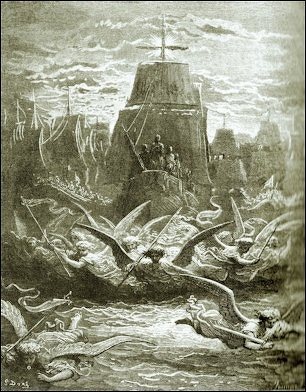
Louis IX departing for the Crusades
“The king of France, before he commenced any hostilities, sent by a herald a letter to the sultan Nedjm-Eddin, conceived in the following words: "You are not ignorant that I am the prince of those who follow the religion of Jesus CHRIST, as you are of those who obey the laws of Muhammad. Your power inspires me with no fear. how should it? I who make the Muslims in Spain tremble! I lead them as a shepherd does a flock of sheep. I have made the bravest among them perish, and loaded their women and children with chains. They endeavour by presents to appease me, and turn my arms to another quarter. The soldiers who march under my standards cover the plains, and my cavalry is not less redoubtable. You have but one method to avoid the tempest that threatens you. Receive priests, who will teach you the Christian religion', embrace it, and adore the Cross; otherwise I will pursue you everywhere, and God shall decide whether you or I be master of Egypt."
“Nedjm-Eddin, on reading this letter, could not restrain his tears. He caused the following answer to be written by the cadi Behaedin, his secretary: "In the name of the Omnipotent and All-merciful God, salvation to our prophet Muhammad and his friends ! I have received your letter it is filled with menaces, and you make a boast of the great number of your soldiers. Are you ignorant that we know the use of arms, and that we inherit the valour of our ancestors? No one has ever attacked us without feeling our superiority. Recollect the conquests we have made from the Christians; we have driven them from the lands they possessed; their strongest towns have fallen under our blows. Recall to your mind that passage of the Qu'ran, which says, 'Those who make war unjustly shall perish ;' and also another passage, ' How often have the most numerous armies been destroyed by a handful of soldiers !' God protects the just; and we have no doubt of his protection, nor that he will confound your arrogant designs."
“The French disembarked on the Saturday, on the same shore where Fakreddin had made his encampment, and pitched a red tent for their king. The Muslims made some movements to prevent their landing; and the emirs Nedjm-Eddin and Sarimeddin were slain in these skirmishes.
French Capture Damietta in the Nile Delta
Makrisi wrote: “At the beginning of the night the emir Fakreddin decamped with his whole army, and crossed the bridge which leads to the eastern shore of the Nile, whereon Damietta is situated. He took the road to Achmoum-Tanah, and by this march the French were left masters of the western bank of that river. [Source: Source: Makrisi, “Essulouk li Mariset il Muluk” [“The Road to Knowledge of the Return of Kings”], in “Chronicles of the Crusades,” ed. H.G.B. (London: Henry G. Bohn, 1848: reissued New York: AMS Press, 1969), pp. 535-556. Makrisi was born 120 years after the expedition of St. Louis.]
“It is impossible to paint the despair of the inhabitants of Damietta when they saw the emir Fakreddin march away from their town, and abandon them to the fury of the Christians.. They were afraid to wait for the enemy, and quitted their town precipitately during the night. This conduct of the Muslim general was so much the less excusable as the garrison was composed of the bravest of the tribe of Beni-Kenane, and as Damietta was in a better 6tate of resistance than when it was besieged by the Franks during the reign of the sultan Elmelikul-Kamil; for, although plague and famine afflicted the town, the Franks could not conquer it until after sixteen months' siege.
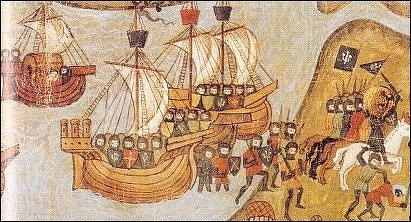
Damietta
“On the Monday morning (6th June, 1249), the French came before the town; but, astonished to see no one, they were afraid of a surprise. They were soon informed of the flight of its inhabitants, and, without striking a blow, took possession of this important place, and all the ammunition and provision they found there.
“When the news of the capture of Damietta reached Cairo, the consternation was general. They considered how greatly this success would augment the courage and hopes of the French; for they had seen an army of Muslims timorously fly before them, and were in possession of an innumerable quantity of arms of all sorts, with plenty of ammunition and provision. The disorder of the sultan, which daily grew worse, and hindered him from acting in this critical state of affairs, overwhelmed the Egyptians with despair. No one now longer doubted but that the kingdom would be conquered by the Christians.
“The sultan, indignant at the cowardice of the garrison, ordered fifty of the principal officers to be strangled. In vain did they allege in their defence the retreat of the emir Fakreddin: the sultan told them they deserved death, for having quitted Damietta without his orders. One of these officers, condemned to death with his son, requested to be executed first; but the sultan refused him this favour, and the father had the misery to see his son expire before his eyes.
“After this execution, the sultan, turning to the emir Fakreddin, asked with “What resistance have yon made? What battles have you fought? You could not withstand the Franks one hour. You should have shewn more courage and firmness." The officers of the army, fearing for Fakreddin the rage of the sultan, made the emir understand by their gestures that they were ready to massacre their sovereign. Fakreddin refused his assent, and told them afterward that the sultan could not live more than a few days; and that, if the prince wished to trouble them, they were able at any time to get rid of him.
Muslims Prepare to Fight Back as Their Sultan Dies
Makrisi wrote: “Nedjm-Eddin, notwithstanding his melancholy state, gave orders for his departure for Mansoura. He entered his boat of war,* and arrived there on Wednesday the 25th of the moon Sefer (June 9, AD 1249). He put the town in a posture of defence by employing his whole army on this service. The boats ordered by the prince before his departure arrived laden with soldiers, and all sorts of ammunition. Every one able to bear arms ranged himself under his standards, and he was joined by the Arabs in great numbers. [Source: Source: Makrisi, “Essulouk li Mariset il Muluk” [“The Road to Knowledge of the Return of Kings”], in “Chronicles of the Crusades,” ed. H.G.B. (London: Henry G. Bohn, 1848: reissued New York: AMS Press, 1969), pp. 535-556. Makrisi was born 120 years after the expedition of St. Louis.]
“While the sultan was making his preparations, the French were adding new fortifications to Damietta, and placed there a considerable garrison. On Monday, the last day of the moon Rebiulewel (July 12~ AD 1249) thirty-six Christian prisoners were conducted to Cairo; they had belonged to the guard of the camp against the inroads of the Arabs, among whom were two knights. The 5th of the same moon, thirty-seven were sent thither on the 7th, twenty-two; and on the 16th, forty-five other prisoners; and among these last were three knights.

Damietta
“On the Monday morning (6th June, 1249), the French came before the town; but, astonished to see no one, they were afraid of a surprise. They were soon informed of the flight of its inhabitants, and, without striking a blow, took possession of this important place, and all the ammunition and provision they found there.
“When the news of the capture of Damietta reached Cairo, the consternation was general. They considered how greatly this success would augment the courage and hopes of the French; for they had seen an army of Muslims timorously fly before them, and were in possession of an innumerable quantity of arms of all sorts, with plenty of ammunition and provision. The disorder of the sultan, which daily grew worse, and hindered him from acting in this critical state of affairs, overwhelmed the Egyptians with despair. No one now longer doubted but that the kingdom would be conquered by the Christians.
“The sultan, indignant at the cowardice of the garrison, ordered fifty of the principal officers to be strangled. In vain did they allege in their defence the retreat of the emir Fakreddin: the sultan told them they deserved death, for having quitted Damietta without his orders. One of these officers, condemned to death with his son, requested to be executed first; but the sultan refused him this favour, and the father had the misery to see his son expire before his eyes.
“After this execution, the sultan, turning to the emir Fakreddin, asked with “What resistance have yon made? What battles have you fought? You could not withstand the Franks one hour. You should have shewn more courage and firmness." The officers of the army, fearing for Fakreddin the rage of the sultan, made the emir understand by their gestures that they were ready to massacre their sovereign. Fakreddin refused his assent, and told them afterward that the sultan could not live more than a few days; and that, if the prince wished to trouble them, they were able at any time to get rid of him.
Muslims Prepare to Fight Back as Their Sultan Dies
Makrisi wrote: “Nedjm-Eddin, notwithstanding his melancholy state, gave orders for his departure for Mansoura. He entered his boat of war,* and arrived there on Wednesday the 25th of the moon Sefer (June 9, AD 1249). He put the town in a posture of defence by employing his whole army on this service. The boats ordered by the prince before his departure arrived laden with soldiers, and all sorts of ammunition. Every one able to bear arms ranged himself under his standards, and he was joined by the Arabs in great numbers. [Source: Source: Makrisi, “Essulouk li Mariset il Muluk” [“The Road to Knowledge of the Return of Kings”], in “Chronicles of the Crusades,” ed. H.G.B. (London: Henry G. Bohn, 1848: reissued New York: AMS Press, 1969), pp. 535-556. Makrisi was born 120 years after the expedition of St. Louis.]
“While the sultan was making his preparations, the French were adding new fortifications to Damietta, and placed there a considerable garrison. On Monday, the last day of the moon Rebiulewel (July 12~ AD 1249) thirty-six Christian prisoners were conducted to Cairo; they had belonged to the guard of the camp against the inroads of the Arabs, among whom were two knights. The 5th of the same moon, thirty-seven were sent thither on the 7th, twenty-two; and on the 16th, forty-five other prisoners; and among these last were three knights.
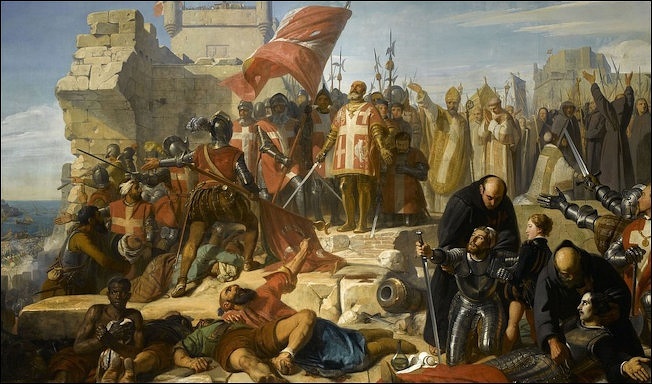
“Different Christian princes, who held lands on the coast of Syria, had accompanied the French, by which their places were weakened. The inhabitants of Damascus seized this opportunity to besiege Sidon, which, after some resistance, was forced to surrender. The news of this, when carried to Cairo, caused an excess of joy, and seemed to compensate for the loss of Damietta. Prisoners were made almost daily from the French, fifty of whom were sent to Cairo the 18th of the moon Diemazilewel (Aug. 29, AD 1249).
“The sultan continued daily to grow worse in health; and the physicians despaired of his recovery, for he was attacked at the same time by a fistula and an ulcer on his lungs. At length he expired, on the night of the 15th of the moon Chaban (Nov. 22), after having appointed as his successor his son Touran-Chah. Nedjm-Eddin was forty-four years old when he died, and had reigned ten years. It was he who instituted that militia of slaves, or of Mamelukes-Baharites,* thus called from being quartered in the castle which this prince had built in the island of Roudah, opposite to old Cairo. This militia, in course of time, seized on the throne of Egypt.
“As soon as the sultan had expired, the sultana Chegeret-Eddur, his spouse, sent for the general Fakreddlin and the eunuch Diemaleddin, to inform them of the death of the sultan, and to request their assistance in supporting the weight of government at such a critical period. All three resolved to keep the sultan's death a secret, and to act in his name as if he were alive. His death was not to be made public until after the arrival of Touran-Chah, to whom were sent messengers after messengers. Notwithstanding these precautions, the French were informed of his death. Their army instantly quitted the plains of Damietta, and encamped at Fariskour. Boats laden with provision and stores came up the Nile, and kept the army abundantly supplies.”
French and Muslims Fight Near Cairo
Makrisi wrote: “The emir Fakreddin sent a letter to Cairo, to inform the inhabitants of the approach of the French, and to exhort them to sacrifice their lives and fortunes in the defence of the country. This letter was read in the pulpit of the great mosque, and the people answered only with sighs and groans. Every thing was in trouble and confusion; and the death of the sultan, which was suspected, added to the consternation. The most cowardly thought of quitting a town which they believed unable to withstand the French; but the more courageous, on the contrary, marched to Mansoura, to join the Muslim army. [Source: Source: Makrisi, “Essulouk li Mariset il Muluk” [“The Road to Knowledge of the Return of Kings”], in “Chronicles of the Crusades,” ed. H.G.B. (London: Henry G. Bohn, 1848: reissued New York: AMS Press, 1969), pp. 535-556. Makrisi was born 120 years after the expedition of St. Louis.]
“On Tuesday, the 1st day of the moon Ramadan (Dec. 7, AD 1249), there were some trifling skirmishes between different corps of troops of each army. This, however, did not prevent the French army from encamping at Charmesah: the Monday following, being the 7th of the same moon, the army advanced to Bermoun. On Sunday, the 13th day of the same moon, the Christian army appeared before the town of Mansoura, the branch of the Achmoum was between it and the Egyptian camp. Nasir Daoud, prince of Karak, was on the western bank of the Nile with some troops. The French traced out their camp, surrounding it with a deep ditch surmounted by a palisado, and erected machines to cast stones at the Egyptian army. Their fleet arrived at the same time; so that there were engagements on water and on land. On Wednesday, the 15th day of the same moon, six deserters passed over to the camp of the Muslims, and informed them that the French army was in want of provision .
“The day of Bairam,* a great lord, and relation to the king of France, was made prisoner. Not a day passed without skirmishes on both sides, and with alternate success. The Muslims were particularly anxious to make prisoners, to gain information as to the state of the enemy's army, and used all sorts of strategies for this purpose. A soldier from Cairo bethought himself of putting his head withinside of a watermelon, the interior of which he had scooped out, and of thus swimming toward the French camp; a Christian soldier, not suspecting a trick, leaped into the Nile to seize the melon; but the Egyptian was a stout swimmer, and catching hold of him, dragged him to his general.+
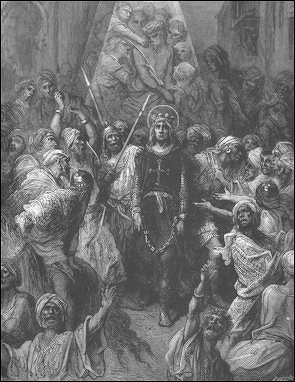
Louis as a Muslim prisoner
“On Wednesday, the 7th day of the moon Chewal (Jan. 12, 1250), the Muslims captured a large boat, in which were a hundred soldiers, commanded by an officer of distinction. On Thursday, the 15th of the same moon, the French marched out of their camp, and their cavalry began to move. The troops were ordered to file off, when a slight skirmish took place, and the French left on the field forty cavaliers with their horses. On the Friday, seventy prisoners were conducted to Cairo, among whom were three lords of rank. On the 22nd of the same moon, a large boat belonging to the French took fire, which was considered as a fortunate omen for the Muslims.
“Some traitors having shewn the ford over the canal of Achmoum to the French, fourteen hundred cavaliers crossed it, and fell unexpectedly on the camp of the Muslims, on a Tuesday, the 15th day of the moon Zilkalde (Feb. 8), having at their head the brother of the king of France. The emir Fakreddin was at the time in the bath: he instantly quitted it with precipitation, and mounted a horse without saddle or bridle, followed only by some slaves. The enemy attacked him on all sides, but his slaves, like cowards, abandoned him when in the midst of the French: it was in vain he attempted to defend himself; he fell pierced with wounds. The French, after the death of Fakreddin, retreated to Djedile; but their whole cavalry advanced to Mansoura, and, having forced one of the gates, entered the town: the Muslims fled to the right and left. The king of France had already penetrated as far as the sultan's palace, and victory seemed ready to declare for him, when the Baharite slaves, led by Bibars, advanced, and snatched it from his hands: their charge was so furious that the French were obliged to retreat. The French infantry, during this time, had advanced to cross the bridge; had they been able to join their cavalry, the defeat of the Egyptian army, and the loss of the town of Mansoura, would have been inevitable.
“Nigh separated the combatants, when the French retreated in disorder to Djedile, after leaving fifteen hundred of their men on the field They surrounded their camp with a ditch and wall, but their army was divided* into two corps: the least considerable body was encamped on the branch of the Achmoum, and the larger on the great branch of the Nile that runs to Damietta.
St. Louis Captured as French Are Defeated Near Cairo
Makrisi wrote: “On Friday, the 27th of the moon Zilhige (April 1), the French set fire to all their machines of war and timber for building, and rendered almost all their boats unfit for use. During the night of Tuesday,* the 3rd day of the moon Mahasem (April 5), in the year of the Hegira 648, the whole of the French army decamped, and took the road to Damietta. Some boats which they had reserved fell down the Nile at the same time. The Muslims having, at break of day of the Wednesday, perceived the retreat of the French, pursued and attacked them.
“The heat of the combat was at Fariskour. The French were defeated and put to flight: ten thousand of their men fell on the field of battle, some say thirty thousand. Upwards of one hundred thousand horsemen, infantry, trades-people, and others, were made slaves. The booty was immense in horses, mules, tents, and other riches. There were but one hundred slain on the side of the Muslims. The Baharite slaves, under the command of Bibars Elbondukdari, performed in this battle signal acts of valour. The king of France had retired, with a few of his lords, to a small hillock, and surrendered himself, under promise of his life being spared, to the eunuch Djemaddelin Mahsun-Elsalihi: he was bound with a chain, and in this state conducted to Mansoura, where he was confined in the house of Ibrahim-ben Lokman, secretary to the sultan, and under the guard of the eunuch Sahil. The king's brother was made prisoner at the same time, and carried to the same house. The sultan provided for their subsistence. [Source: Source: Makrisi, “Essulouk li Mariset il Muluk” [“The Road to Knowledge of the Return of Kings”], in “Chronicles of the Crusades,” ed. H.G.B. (London: Henry G. Bohn, 1848: reissued New York: AMS Press, 1969), pp. 535-556. Makrisi was born 120 years after the expedition of St. Louis.]
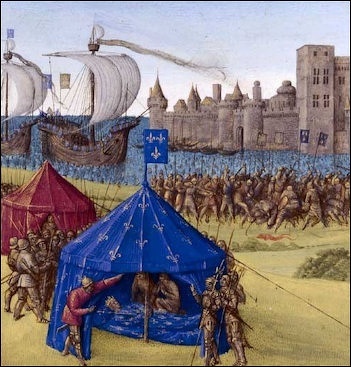
Battle of Tunis and Death of Louis IX
“The number of slaves was so great, it was embarrassing, and the sultan gave orders to Seifeddin-Jousef-ben-tardi to put them to death. Every night this cruel minister of the vengeance of his master had from three to four hundred of the prisoners brought from their places of confinement, and, after he had caused them to be beheaded, their bodies were thrown into the Nile; in this manner perished one hundred thousand of the French.
“The sultan departed from Mansoura, and went to Fariskour where he had pitched a most magnificent tent. He had also built a tower of wood over the Nile; and, being freed from a disagreeable war, he there gave himself up to all sorts of debauchery.
“The victory he had just gained was so brilliant that be was eager to make all who were subjected to him acquainted with it. He wrote with his own hand a letter in the following terms, to the emir Djemal-Edden-ben-Jagmour, governor of Damascus: "Thanks be given to the All-powerful, who has changed our grief to joy: it is to him alone we owe the victory. The favours he has condescended to shower upon us are innumerable, but this last is most precious. You will announce to the people of Damascus, or rather to all Muslims, that God has enabled us to gain a complete victory over the Christians, at the moment they had conspired our ruin.
"On Monday, the first day of this year, we opened our treasury, and distributed riches and arms to our faithful soldiers. We had called to our succour the Arabian tribes, and a numberless multitude of soldiers ranged themselves under our standards. On the nights between Tuesday and Wednesday, our enemies abandoned their camp with all their baggage, and marched towards Damietta: in spite of the obscurity of the night, we pursued them, and thirty thousand of them were left dead on the field, not including those who precipitated themselves into the Nile. We have beside slain our very numerous prisoners, and thrown their bodies into the same river. Their king had retreated to Minieh: he has implored our clemency, and we have granted him his life, and paid him all the honours due to his rank. We have regained Damietta."
“The sultan, with this letter, sent the king's cap, which had fallen in the combat: it was of scarlet, lined with a fine fur. The governor of Damascus put the king's cap on his own head when he read to the public the sultan's letter. A poet made these verses on the occasion: "The cap of the French was whiter than paper: our sabres have dyed it with the blood of the enemy, and have changed its colour."
St. Louis Freed
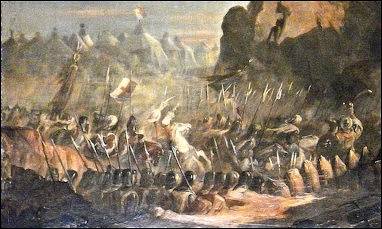
Mongols and Templars attacking Jerusalem in 1299
“The emir Abou-Ali was nominated to treat with the king of France for his ransom, and for the surrender of Damietta. After many conferences and disputes, it was agreed that the French should evacuate Damietta, and that the king, and all prisoners in Egypt, should be set at liberty, on condition of paying down one half of such ransom as should be fixed on. The king of France sent orders to the governor of Damietta to surrender that town: but he refused to obey, and new orders were necessary. At last it was given up to the Muslims, after having remained eleven months in the hands of the enemy. The king paid four hundred thousand pieces of gold, as well for his own ransom as for that of the queen, his brother, and the other lords that had accompanied him. [Source: Source: Makrisi, “Essulouk li Mariset il Muluk” [“The Road to Knowledge of the Return of Kings”], in “Chronicles of the Crusades,” ed. H.G.B. (London: Henry G. Bohn, 1848: reissued New York: AMS Press, 1969), pp. 535-556. Makrisi was born 120 years after the expedition of St. Louis.]
“All the Franks that bad been made prisoners during the reigns of the sultans Hadil-Kamil, Salih-Nedjm-Eddin, and Touran-Chah, obtained their liberty: they amounted to twelve thousand one hundred men and ten women. The king, with all the French, crossed to the westward branch of the Nile, and embarked on a Saturday for Acre.*
“The poet, Essahib-Giemal-Edden-Ben-Matroub made, on the departure of this prince, the following verses: <br/> Bear to the king of France, when you shall see him, these words, traced by a partisan of truth: The death of the servants of the Messiah has been the reward given to you by God. <br/> You have landed in Egypt, thinking to take possession of it. You have imagined that it was only peopled with cowards ! you who are a drum filled with wind. <br/> You thought that the moment to destroy the Muslims was arrive(l; and this false idea has smoothed, in your eyes, every difficulty. <br/> By your excellent conduct, you have abandoned your soldiers on the plains of Egypt, and the tomb has gaped under their feet. <br/> What now remains of the seventy thousand who accompanied you? Dead, wounded, and prisoners ! <br/> May God inspire you often with similar designs ! They will cause the ruin of all Christians, and Egypt will have no longer to dread any thing from their rage. <br/> Without doubt, your priests announced victories to you: their predictions were false. <br/> Refer yourselves to a more enlightened oracle. <br/> Should the desire of revenge urge you to return to Egypt, be assured the house of Lokman still remains, that the chain is ready prepared, and the eunuch awake."*
“Great rejoicings were made at Cairo and throughout Egypt, for the restoration of Damietta. The army broke up its encampment, and returned to the capital, when the sultana loaded the officers with presents, and her liberalities extended to the meanest soldier.
St. Louis Resumes Crusade Against Muslims in Tunis
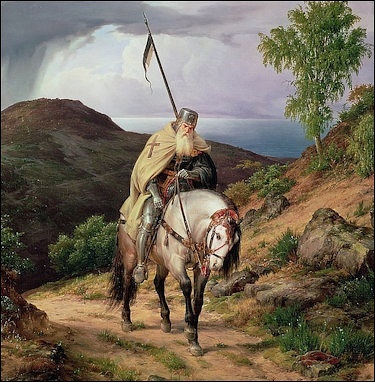
Last Crusader
“The king of France,* having fortunately escaped from the hands of the Egyptians, resolved to make war against the kingdom of Tunis. He chose a time when a horrible famine ravaged Africa, and sent an ambassador to the pope, whom the Christians consider as the vicar of the Messiah. This pontiff gave him permission to take for the support of this war the wealth of churches. He also sent ambassadors to all the kings in Christendom, to demand assistance, and to engage them to unite with him in this expedition. The kings of England, of Scotland, and of Aragon, the count of Toulouse, and many other Christian princes, accepted of his invitation.
“Abouabdoullah-Muhammad-Elmoustausir-Billah, son to the emir Abizikeria, then reigned at Tunis. The report of this intended expedition came to his ears, and he sent an ambassador to the king of France to sue for peace, offering eighty thousand pieces of gold to obtain it. The king took the money, but did not the less carry his arms into Africa. He landed on the shore of the plains of Carthage, and laid siege to Tunis the last day of the moon Zilkade, in the 668th year of the Hegira (July 21, AD 1270).
“His army was composed of thirty thousand infantry and six thousand cavalry. The siege lasted six months. On the 15th of the month Muharsem, the first month of the year 669, there was a bloody battle, in which numbers were slain on each side. The Tunisians were on the point of being destroyed, when the death of the king of France changed the face of affairs. The French, after this event, only thought of making peace and returning to their own country.
One Ismael-Erreian, an inhabitant of Tunis, made the following verses during the siege: <br/> Frenchman, art thou ignorant that Tunis is the sister of Cairo? Think on the fate that awaits thee ! Thou wilt find before this town thy tomb, instead of the house of Lokman; and the two terrible angels, Munkir and Nakir, will take the place of the eunuch Sahil."* <br/> This king of France had a good understanding, but was of an artful character.
Fall of Acre (1291)
Carl A. Volz wrote: “Interest in the struggle for retention of the Holy Land was declining. Kings and popes, however, continued to levy crusading taxes, but they never produced another crusade. Tripoli yielded to the Moslems, and in 1291 Acre was attacked and captured. The remaining Christian towns capitulated in quick succession. [Source: Carl A. Volz, late professor of church history at Luther Seminary, The Apostolic Fathers. web.archive.org, martin.luthersem.edu /~]
“In later years it was a sign of the deterioration of the crusading ideal when the crusading spirit was directed against fellow Christians in the West. The most notable instance was the "crusade" against the Waldensians in the late 12th C. and the ill-conceived "Albigensian crusade." Meanwhile the Turks advanced once again in the East. The Tatars and Mongols advanced, whose empire extended from Peking to Asia Minor, and from Siberia to Hungary. Their most famous leader, Genghis Khan, died in 1227. In 1244 the new invaders captured Jerusalem from the Turks, but on the whole relations between Christian and Mongol was better than between Christian and Moslem. Marco Polo and Prester John were well received by the Mongols in their travels. The Turkish advance culminated in the capture of Constantinople in 1453, which city is today still in Turkish hands. Great naval victory over the Turks by Don Juan of Austria at Lepanto in 1571.” /~\
Legacy of The Crusades
Europeans accomplished little with The Crusades. In the end they lost the Holy Land, gained no new territory and lost thousands of soldiers. Europeans eventually lost their enthusiasm for The Crusades and the huge loss of life and financial loses they created. The Crusaders left the Middle East for good in 1271. After attending a final mass in a church outside the Syrian city of Tartus they sailed away leaving the Holy Land to the Muslims.
"Despite the alarms of the Christian rulers," wrote Boorstin, "and the Tartar massacres of Poles and Hungarians, the Tartars would prove powerful allies against the Muslims and the Turks who blocked the eastward path. For the Tartars, after succeeding in their campaigns against the "Assassins," or Ismailians, on the southern shores of the Caspian, went on to overcome the Caliph of Baghdad and Syria." One Tartar general even sent a mission to France to ask King Louis IX for help in their fight against Muslim Turks who possessed the Holy Land. Boorstin believes that if the alliance was made much of the Middle East and Asia would probably be Christian today.
The Crusades lead to an us versus them mentality: Christendom versus the infidels. The chivalric system began to break down in The Crusades and the Reformation, when the enemy was longer regarded as Christian equals but rather as infidels that did not deserve equal treatment.
Image Sources: Wikimedia Commons
Text Sources: Internet Islamic History Sourcebook: sourcebooks.fordham.edu “World Religions” edited by Geoffrey Parrinder (Facts on File Publications, New York); “ Arab News, Jeddah; “Islam, a Short History” by Karen Armstrong; “A History of the Arab Peoples” by Albert Hourani (Faber and Faber, 1991); “Encyclopedia of the World Cultures” edited by David Levinson (G.K. Hall & Company, New York, 1994). “Encyclopedia of the World’s Religions” edited by R.C. Zaehner (Barnes & Noble Books, 1959); Metropolitan Museum of Art, National Geographic, BBC, New York Times, Washington Post, Los Angeles Times, Smithsonian magazine, The Guardian, BBC, Al Jazeera, Times of London, The New Yorker, Time, Newsweek, Reuters, Associated Press, AFP, Lonely Planet Guides, Library of Congress, Compton’s Encyclopedia and various books and other publications.
Last updated September 2018
